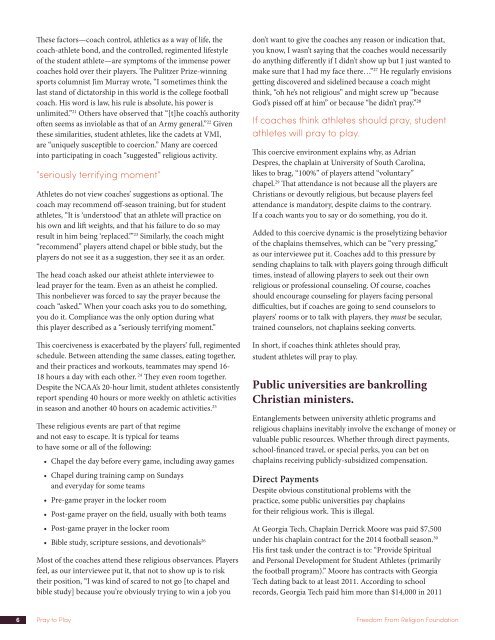Pray Play
PraytoPlay
PraytoPlay
You also want an ePaper? Increase the reach of your titles
YUMPU automatically turns print PDFs into web optimized ePapers that Google loves.
These factors—coach control, athletics as a way of life, thecoach-athlete bond, and the controlled, regimented lifestyleof the student athlete—are symptoms of the immense powercoaches hold over their players. The Pulitzer Prize-winningsports columnist Jim Murray wrote, “I sometimes think thelast stand of dictatorship in this world is the college footballcoach. His word is law, his rule is absolute, his power isunlimited.” 21 Others have observed that “[t]he coach’s authorityoften seems as inviolable as that of an Army general.” 22 Giventhese similarities, student athletes, like the cadets at VMI,are “uniquely susceptible to coercion.” Many are coercedinto participating in coach “suggested” religious activity.“seriously terrifying moment”Athletes do not view coaches’ suggestions as optional. Thecoach may recommend off-season training, but for studentathletes, “It is ‘understood’ that an athlete will practice onhis own and lift weights, and that his failure to do so mayresult in him being ‘replaced.’” 23 Similarly, the coach might“recommend” players attend chapel or bible study, but theplayers do not see it as a suggestion, they see it as an order.The head coach asked our atheist athlete interviewee tolead prayer for the team. Even as an atheist he complied.This nonbeliever was forced to say the prayer because thecoach “asked.” When your coach asks you to do something,you do it. Compliance was the only option during whatthis player described as a “seriously terrifying moment.”This coerciveness is exacerbated by the players’ full, regimentedschedule. Between attending the same classes, eating together,and their practices and workouts, teammates may spend 16-18 hours a day with each other. 24 They even room together.Despite the NCAA’s 20-hour limit, student athletes consistentlyreport spending 40 hours or more weekly on athletic activitiesin season and another 40 hours on academic activities. 25These religious events are part of that regimeand not easy to escape. It is typical for teamsto have some or all of the following:• Chapel the day before every game, including away games• Chapel during training camp on Sundaysand everyday for some teams• Pre-game prayer in the locker room• Post-game prayer on the field, usually with both teams• Post-game prayer in the locker room• Bible study, scripture sessions, and devotionals 26Most of the coaches attend these religious observances. <strong>Play</strong>ersfeel, as our interviewee put it, that not to show up is to risktheir position, “I was kind of scared to not go [to chapel andbible study] because you’re obviously trying to win a job youdon’t want to give the coaches any reason or indication that,you know, I wasn’t saying that the coaches would necessarilydo anything differently if I didn’t show up but I just wanted tomake sure that I had my face there…” 27 He regularly envisionsgetting discovered and sidelined because a coach mightthink, “oh he’s not religious” and might screw up “becauseGod’s pissed off at him” or because “he didn’t pray.” 28If coaches think athletes should pray, studentathletes will pray to play.This coercive environment explains why, as AdrianDespres, the chaplain at University of South Carolina,likes to brag, “100%” of players attend “voluntary”chapel. 29 That attendance is not because all the players areChristians or devoutly religious, but because players feelattendance is mandatory, despite claims to the contrary.If a coach wants you to say or do something, you do it.Added to this coercive dynamic is the proselytizing behaviorof the chaplains themselves, which can be “very pressing,”as our interviewee put it. Coaches add to this pressure bysending chaplains to talk with players going through difficulttimes, instead of allowing players to seek out their ownreligious or professional counseling. Of course, coachesshould encourage counseling for players facing personaldifficulties, but if coaches are going to send counselors toplayers’ rooms or to talk with players, they must be secular,trained counselors, not chaplains seeking converts.In short, if coaches think athletes should pray,student athletes will pray to play.Public universities are bankrollingChristian ministers.Entanglements between university athletic programs andreligious chaplains inevitably involve the exchange of money orvaluable public resources. Whether through direct payments,school-financed travel, or special perks, you can bet onchaplains receiving publicly-subsidized compensation.Direct PaymentsDespite obvious constitutional problems with thepractice, some public universities pay chaplainsfor their religious work. This is illegal.At Georgia Tech, Chaplain Derrick Moore was paid $7,500under his chaplain contract for the 2014 football season. 30His first task under the contract is to: “Provide Spiritualand Personal Development for Student Athletes (primarilythe football program).” Moore has contracts with GeorgiaTech dating back to at least 2011. According to schoolrecords, Georgia Tech paid him more than $14,000 in 20116 <strong>Pray</strong> to <strong>Play</strong> Freedom From Religion Foundation


